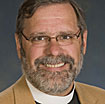Commentary on Psalm 146
The first lesson addresses a fearful people with a prophetic promise that God will bring justice, salvation, and healing.
God’s redemptive action applies not only to humans but even extends to the hydration of the desiccated earth. The magnitude of the restoration (or the depth of the despair of the ailing — or both!) is suggested by the promise that when the great day comes the lame will not merely walk but dance, the mute not merely speak but sing.
Psalm 146 responds to the first lesson by giving us the lyrics of the song that they — and the whole restored creation — might sing! The psalm does not reveal the where or what of the specific event that elicits praise, though in the later verses we find echoes of the promises made in the first lesson.
Verse 1 is an exuberant first person reflexive imperative (the psalmist’s sticky-note reminder): “Praise the LORD, O my soul!” Verse 2 then broadens the scope; the psalmist declares to all who hear that God has acted in such a way that the resounding praise will last the psalmist’s whole life.
In verse 3 the psalmist begins to explain and describe why God is worthy of this endless praise. The dominant frame is the trustworthiness of God’s sovereignty in terms of both its duration (forever) and its salutary effects (justice, healing, etc.). In terms of structure, duration dominates insofar as it brackets the catalog of effects through a grand antithesis.
In verses 3 and 4 the psalmist reminds us of the fixed limitation of all human endeavor: mortality. We have here no negative commentary on human rule or activity, no lament about lack of human wisdom, morality, or will. The trouble is that humans die; their thoughts perish. The antithesis is completed in final verse (verse 10) with the word that God “reigns forever … throughout all generations.”
The interior verses have the feel of an extended beatitude introduced in verse 5 by “Happy are they who have the God of Jacob for their help …” Verses 6-9 contain a mini-salvation history and catalogue of God’s beneficent activities, all of which are positive until the last. God creates, keeps promises, gives justice, feeds the hungry, sets captives free, opens the eyes of the blind, lifts up the lowly, loves the righteous, and cares for strangers, orphans, and widows. The only negative action mentioned is the relatively mild, “… but frustrates the way of the wicked.”
Psalms of praise present a challenge to preachers in that they often fail to provide clues as to the concrete or historical actions that elicit the praise — we have no “itch” or “scratch” but only the sigh of relief. In Psalm 146 we hear of the concrete actions of God and the troubles they overcome.
I’m composing this reflection in the late spring of a presidential election year and already I’m weary of the weariness I feel as I am asked to trust “mortals in whom there is no help.” When I’m in worship on September 9, eight weeks from election day I’d like to hear a sermon that grapples thoughtfully with the warnings in verses 3 and 4, “Put not your trust in rulers, … when they breathe their last … their thoughts perish.”
Even the historical psalmist lived as a citizen of some regime that provided some good. And certainly those of us who live in the developed or developing world enjoy many benefits of human governance — in spite of our cynicism. Help me take seriously the antithetical relationship the psalmist’s words reveal even as I seek to discern how God accomplishes God’s promises through human initiatives and governance.

September 9, 2012